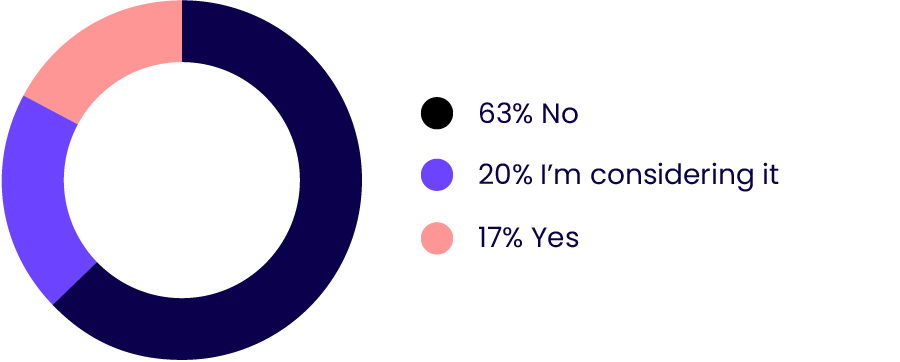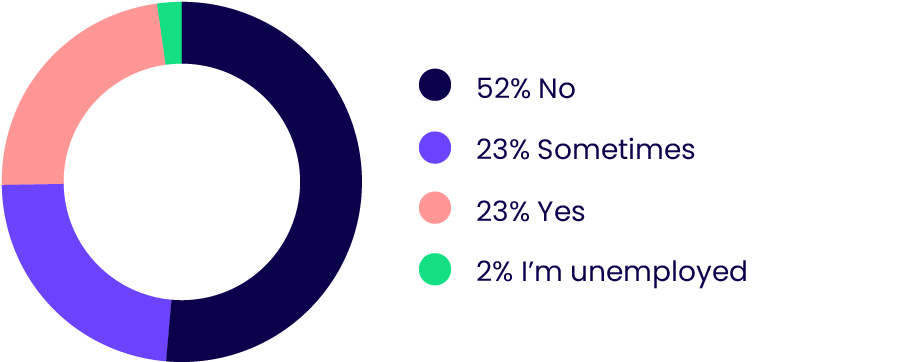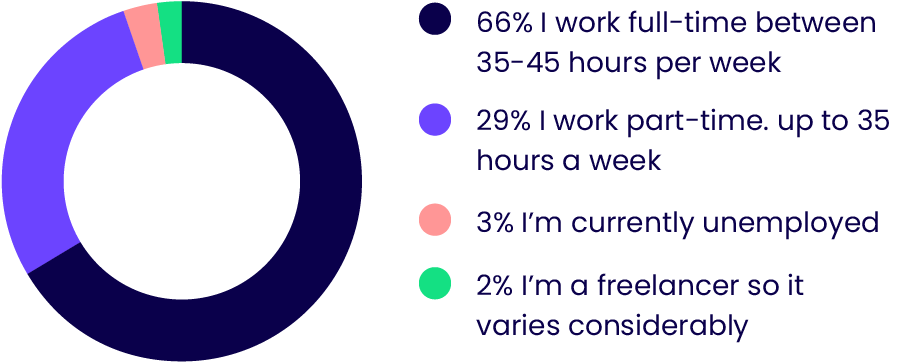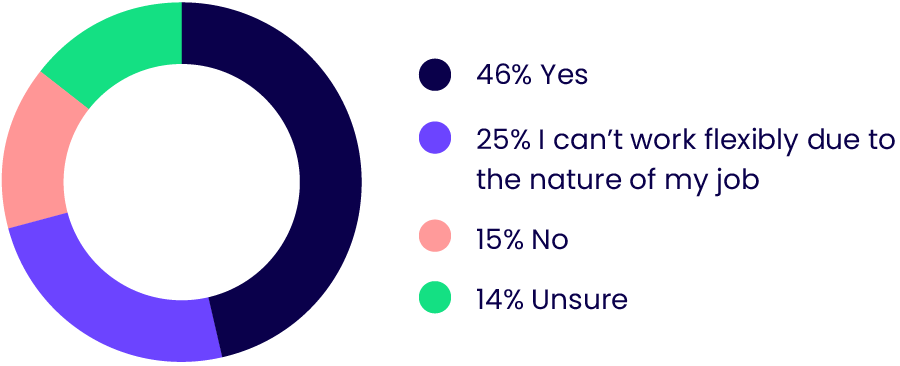The Future of Work: opinion from the frontlines
The working world is changing and it has been, albeit at varying degrees of pace, since labour was first exchanged for some form of currency. However, the past ten years have seen an uprise in tempo, creating what many people are calling the “Future Of Work”. It is a form of work that stems from advancing AI/automation, mobile technology and a generation of workers seeking more autonomy and flexibility in their working lives.
As a result, we’re seeing a fundamental shift in our attitude and approach towards shared information in the working world, specifically how fast information can be shared and processed. This increasing demand for efficiency is affecting everything from employment standards to how fast a task can (and should) be completed. While it’s fantastic for business, what does it mean for workers? Is it a threat? Does it make life easier? And are there new expectations for workers?
Are you looking for flexible work to fit around your lifestyle/commitments?

As an instant consumer insight platform, we asked 120,000 people over a 48 hour period whether they were looking for flexible work. While a large proportion of UK residents are not currently looking for flexible work, nearly 40% of UK residents are either looking to work flexibly or considering it. This not only reflects a huge change in the way people approach work and their careers, it could also indicate that many UK residents require an additional form of income in today’s economy, which could be more easily obtained through flexible work.
these platforms may reduce the need for presenteeism in the office, it hasn’t necessarily reduced the number of hours people are actually working
Those looking for flexible work based on their age:

An interesting point to make out of this is that when broken down by age, the younger age demographics clearly favour flexible working more than their older counterparts.
The pressure on workers
An outcome from advancing technology in the workplace has been the ability to take your work with you, which in many cases means taking your work home and putting in overtime hours.
23% responded “yes”, while a further 23% responded with “sometimes”, which could imply a subtle push from employers to either embrace flexibility or just work more during out-of-office hours
The rise of social media since the mid-noughties and mobile technology since the mid-nineties has seen a young generation of workers grow up with platforms and devices that have allowed them to share information instantaneously. As a result, efficient programmes such as Slack, WeTransfer and Trello have allowed people to complete tasks faster and work on the go.
Although the rise of these platforms may reduce the need for presenteeism in the office, it hasn’t necessarily reduced the number of hours people are actually working in order to get tasks done.
We asked 30,000 UK residents “Do you ever feel pressured by employers to work outside of your regular working hours?

When it comes to the pressure placed on workers to be more available outside of work, the majority of UK residents felt they were not pressured to work outside of their normal working hours. However, 23% responded “yes”, while a further 23% responded with “sometimes”, which could imply a subtle push from employers to either embrace flexibility or just work more during out-of-office hours. Increased pressure to work outside of one’s set working hours is somewhat of a paradox to the very purpose behind the ‘Future of Work’, as it doesn’t focus on the breathing time it gives workers, it simply demands more from them.
Evolving work hours
So, with advancing technology and a pressure to work in our own-time, are people stepping away from full-time working hours? We asked 30,000 UK residents just what their working circumstances were – from full-time to unemployed.
“What best reflects your current working lifestyle?”

Unsurprisingly, full-time work dominates the current working lifestyle of UK residents. This shows that while programmes have made many working tasks easier, it certainly doesn’t mean people are prone to working any less or any differently than they used to week-to-week.
However, when split between men and women, we also found that more women work part-time hours compared to men. This could be for a number of reasons, one of which could be engrained gender stereotypes seeing more women being stay-at-home mothers. While this may be a cultural factor, there has been much discussion around whether or not employers are doing enough when it comes to providing flexible working options for parents.
Working lifestyle broken down by gender:

Changing work environments
Many companies are becoming increasingly competitive with one another when it comes to providing the ideal workplace, often imitating the archetypal workplace and procedures of big-ball players such as Google and Apple. However, understanding what exactly appeals to candidates when hiring can, at times, be vague.
While some focus on pay, there has been a push towards providing and highlighting additional aspects to a role, such as company perks and flexibility. So what does it boil down to for the everyday worker?
We asked 20,000 UK residents “What job feature do you value most when applying for a new job?”

When we asked UK residents about what they value most when applying for a job, our respondents valued the overall salary as the most important factor. Interestingly, the ability to work flexibly came in a close second, taking 36% of the vote, reflecting a push from the public towards more choice and autonomy over their everyday working lives.
We asked 30,000 UK residents “If your employer let you work When and Where you want, do you think you would be more productive?”

Flexibility and Worker’s rights
While the future of work has seen a change in the way employers accommodate the workplace to its employees, it’s also seen the development of an entirely new form of work in the ‘gig economy’. Driven by a rise in mobile technology and a growing thirst for flexibility, the gig economy – whereby jobs are completed in the form of short-term employment called ‘gigs’ – has not come without its troubles.
While the future of work has seen the rise in the adoption of flexible employment strategies, the debate over providing basic, essential worker’s rights has not and can not be ignored.
Issues over worker’s rights and the power of employers in the gig economy have caused an uproar, with the likes of big-name players such as Uber and Deliveroo coming under fire for underpaying and restricting workers rights such as holiday pay and sick pay.
We asked 10,000 UK residents “Do you feel ‘gig economy’ should pay workers the minimum wage, holiday pay and sick pay?”

The perception of the gig economy, in its current format, is clearly out of favour with the general public. 2018 was wrapped in discussion and turmoil around the unfair treatment of gig economy workers – particularly with the likes of Amazon, Deliveroo, Hermes and many more. While the future of work has seen a rise in the adoption of flexible employment strategies, the debate over providing basic, essential worker’s rights has not and can not be ignored.
The rise of the machines
Entrenched within the Future of Work movement is the rise of AI and automation. The term AI is typically left to the sci-fi movies in terms of the 1980s, where robots take over the world, and while the notion of an AI-run world still feels like fiction, it does ponder the question: is there a threat arising in the Future of Work?
changes brought on by advancing technology and small, but equally as important, cultural changes in how we approach work, life and happiness are shaping the new status-quo of today’s labour market.
We asked 30,000 UK residents “Do you feel that the rise of AI technology and automation is a threat to your employment and livelihood?”

Although the rise of AI technology has caused some debate around how we’re tracked and seen as consumers, the general population clearly doesn’t see much of a threat. AI algorithms, deriving from an increasingly large number of data touchpoints associated to each of us, has led to much debate around our privacy and safety – most notably in the form of the recent Cambridge Analytica scandal. It poses the question: how much do we know? And how in control will be in the future?
Today, the term ‘Future of work’ is beginning to feel overused and increasingly pointless as time goes by. The fact is, changes brought on by advancing technology and small, but equally as important, cultural changes in how we approach work, life and happiness are shaping the new status-quo of today’s labour market. We, as a society, are intrinsically seeking more efficiency, purpose and drive in what we do and where we end up in our lives. The ‘future of work’ encapsulates all of those feelings and emotions.
In what has been a small period of time, the working world has changed incredibly quickly. However, our research shows that people are approaching the future of work with optimism – embracing flexibility and the rise of AI technology with open arms. Where it will lead us, only time will tell.
Interested in finding out more? Discover the power of Find Out Now and how we can help your business by getting in touch here.